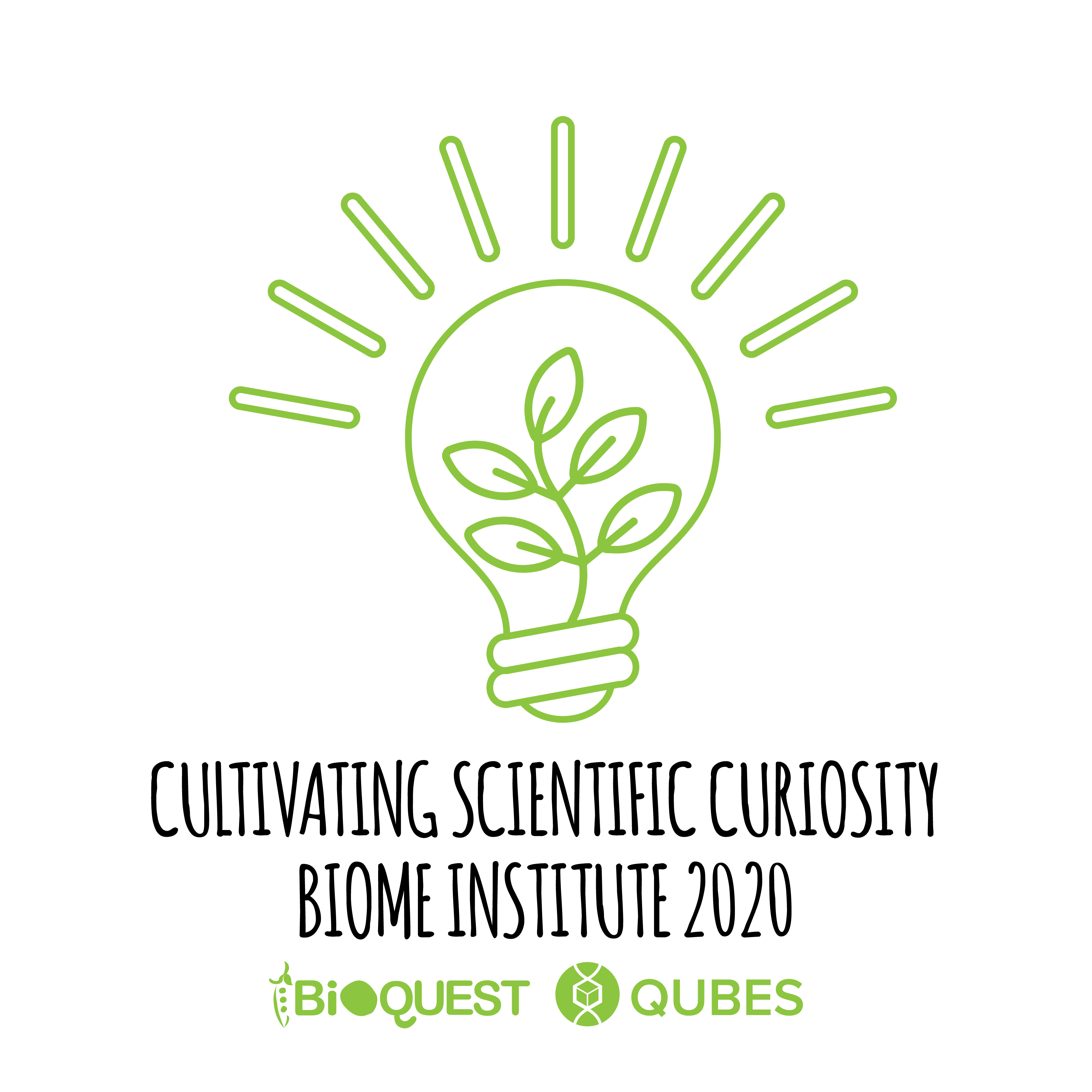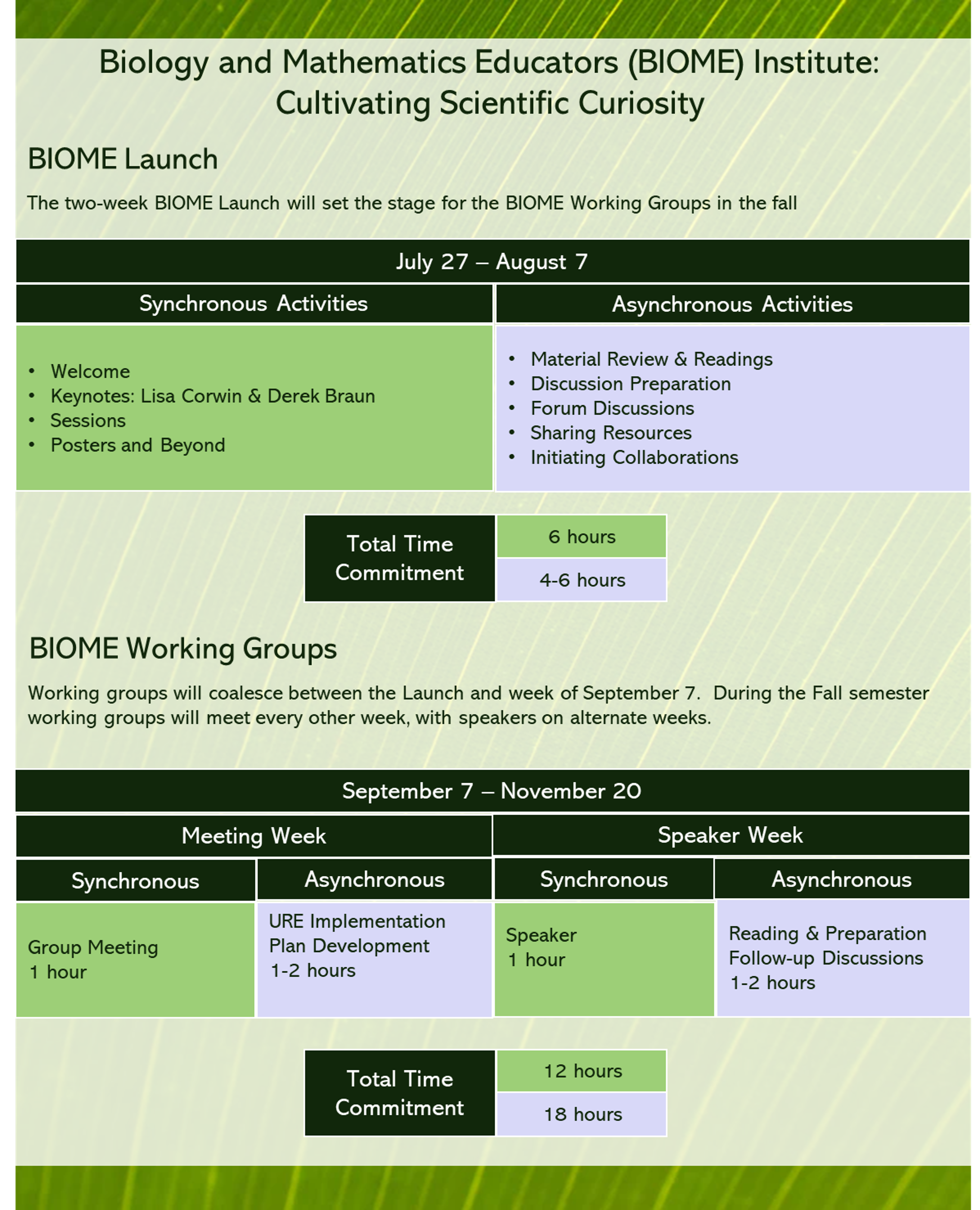Cultivating Scientific Curiosity
General Information
What to Expect | Commitment | Who Should Apply? | Institute Partners | Community Goals
About the BIOME Institute
The BIOME (Biology and Mathematics Educators) Institute offers a unique opportunity to engage with a community of peers to address an educational challenge with the ultimate goal of improving student outcomes. The challenge, in this case, is developing an implementation plan to pilot a new Undergraduate Research Experience (URE) or enhance an existing URE. The community will be supported in this endeavor with access to experts in areas relevant to the challenge, information about useful resources, and community facilitators to guide the development process. The Institute is offered by BioQUEST, with over 30 years of experience in science education reform, in collaboration with QUBES, which supports the quantitative biology community, and a broad range of educational projects.
Research on professional development has demonstrated that it is difficult for even the most committed faculty to change pedagogical approaches working independently for a variety of reasons including time constraints, institutional resistance, and lack of resources. Challenges to meaningful pedagogical change are most often identified during planning or implementation. The BIOME Institute reduces barriers to change by providing faculty with information, resources, community, and guidance as they plan and implement new ideas. The Summer Launch provides a focused, information rich opportunity to develop ideas, identify collaborators, and begin collecting resources. The Fall working groups provide ongoing support, additional resources and information, and peer feedback to increase faculty success in achieving their goals.
Disciplinary and interdisciplinary institutional teams are encouraged to apply. Individuals from all biological disciplines, as well as quantitative, physical and social sciences are welcome to apply. Future faculty are welcome to apply and are encouraged to partner with a faculty member at their institution. Upon completion of the BIOME Institute, participants will become BIOME Fellows, and receive a certificate of completion appropriate for tenure and promotion portfolios, teaching portfolios and CVs.
What to Expect
The BIOME Institute will launch with an opportunity to share ideas and resources, brainstorm about plans, and initiate collaborations. Models of UREs at different institutions will be shared in a virtual sharing session, “Posters & Beyond,” with both synchronous and asynchronous components occurring over two weeks in summer. These models will demonstrate the variety of UREs at different institution types, resources and support programs. Participants will have the opportunity to peruse the models at their convenience and meet with the presenters synchronously for additional discussion. Two keynote speakers will present information relevant to shaping UREs, and participants will be introduced to a variety of resources appropriate for UREs in online introduction sessions. Throughout the BIOME Institute the need to prepare for both in person and online teaching will be considered. Issues around equity and inclusive teaching are also included in the Institute, informed by Universal Design for Learning practices. QUBES and BioQUEST both promote the use of Open Education Materials, which contribute to equity in access.
The two-week BIOME Launch will set the stage for the BIOME Institute in which participants will meet in working groups as they design an implementation plan for a new URE program or an enhancement to an existing URE program. Working groups will explore models of successful UREs, examine critical pedagogical aspects of UREs, and offer peer feedback. BIOME Institute activities in the fall will be structured around asynchronous short presentations, alternating with synchronous working group meetings. During the Fall phase of the Institute, small peer groups of faculty will meet synchronously every other week for 45 minutes to discuss ideas, share resources, and explore pedagogical ideas more deeply. These working groups will be facilitated by members of the BioQUEST and QUBES communities. On alternate weeks, speakers will present ideas about making the most of UREs to engage students in meaningful work and develop a disciplinary way of thinking, as well as addressing issues critical to all students’ success such as inclusive teaching and universal design for learning practices. Speakers will provide resources for further exploration of their topics, and respond to community discussions and questions.
Commitment & Schedule
It is important that all participants are able to commit to the full professional development experience which includes:
- BIOME Launch: July 27 - August 7, 2020
- BIOME Institute: September 7 - November 20, 2020
This is a supportive community of people sharing similar goals and challenges. Colleagues share resources, ideas and advice based on their own experiences, and provide each other with feedback on materials or plans. Your contributions are critical to the success of this experience. We recognize that unexpected circumstances may change schedules and that participants may not be able to attend synchronous events. The BIOME Launch is designed to provide maximum flexibility by providing recordings of synchronous events and access to resources. However, there is no substitute for time spent with your working group and we ask all participants to commit to full participation for the entire program.
Who should apply?
- Faculty interested in undergraduate research experiences of any type, including lecture embedded experiences, CURES, and internships will benefit from the program. Participants may be developing a new program or enhancing an existing program.
- Two-year and four-year faculty teaching all levels of undergraduate biology, quantitative biology, and life science-oriented mathematics will find the program relevant.
- Future faculty are welcome to apply and are encouraged to partner with a faculty member.
- We encourage teams from a single institution or partner institutions to apply, especially interdisciplinary teams and teams combining part time and full time faculty. Each team member must complete an application.
- The meeting sponsors strive to increase the inclusivity and accessibility of this event, and to that end, we encourage persons requiring accommodations to apply and let us know how we can support their participation.
Institute Partners
BioQUEST and QUBES
BioQUEST is a transformative, collaborative community empowering educators to drive innovation in Life Science education and has been offering professional development on the cutting edge of educational reform for over 30 years. BioQUEST supports an interdisciplinary community of science and math educators who work to develop and share effective pedagogical approaches to support all students. The “3 Ps” philosophy of problem posing, problem solving and peer persuasion, has guided the BioQUEST community’s efforts to provide relevant, inclusive educational experiences. Over the years, BioQUEST has offered many projects designed to explore the frontiers of biology education, supporting faculty in an ever changing landscape of content knowledge, tools and resources. BioQUEST is a 501c3 organization.
QUBES arises from the BioQUEST tradition, and provides a virtual center for an interdisciplinary community of educators to continue to work to improve student outcomes in quantitative biology education. An NSF funded project (NSF DBI 1346584, DUE 1446269, DUE 1446258, and DUE 1446284), QUBES brings together networks of practitioners, researchers, and developers to contribute to efforts around improving biology education. The QUBESHub provides a central location for resources and communication, as well as the capacity to run various software tools. QUBES collaborates with quantitative biology projects to disseminate their work and provide professional development around the use of effective pedagogies and vetted resources. QUBES also promotes consideration and development of inclusive and equitable practices, such as Universal Design for Learning in the classroom and diversifying participation in science.
Both BioQUEST and QUBES espouse Open Education approaches as part of our commitment to equity and inclusion. BioQUEST makes past project resources available at bioquest.org, and uses OER in workshops around the world. QUBES supports Open Educational Resources (OER) through a publication system designed to support sharing of adaptations and new resources. Both BioQUEST and QUBES promote scholarly engagement with Open Education Practices (OEP) by promoting sharing of resources by community members through professional development experiences such as this workshop. During the BIOME Institute, we will be engaging in OER and promoting OEP in the Institute and as a way for faculty to promote success for all students.
Community goals
- Use evidence based pedagogical approaches to develop teaching materials for your classroom to improve student outcomes.
- Increase awareness and implementation of inclusive, accessible pedagogical practices.
- Promote the use of OERs.
- Address the need to move between online and in person learning environments.
- Actively participate in a community of like minded peers
More information
Subscribe to the BioQUEST mailing list to receive summer workshop updates: Subscribe
If you have any questions, please contact Hayley Orndorf (hco1 "at" pitt "dot" edu)

